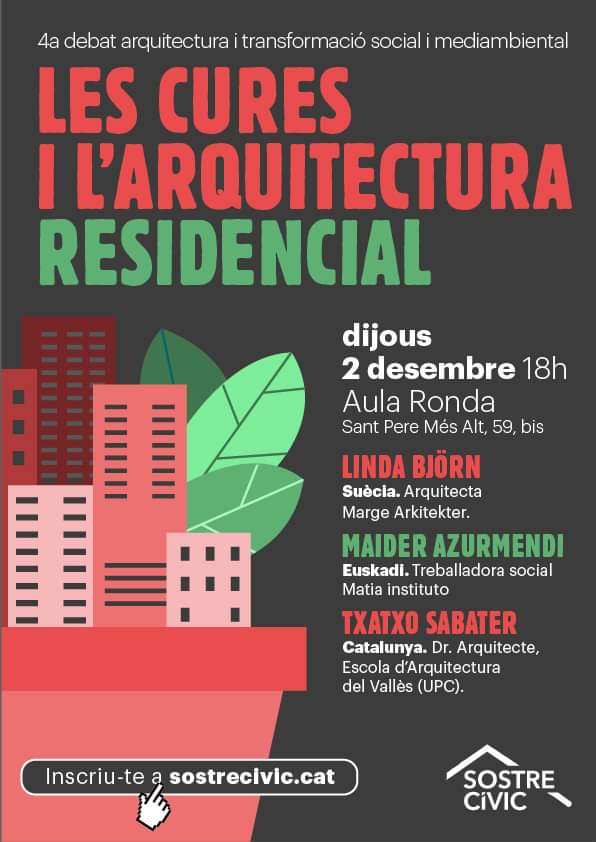Care and residential architecture
Sostre Civic is organising an interesting debate on the role of architecture in social and environmental transformation which, in this edition, focuses on housing and care, what we can call residential with services.
In Spain, the percentage of the population over 65 years of age will be 22.7% of the population in 2026. On the other hand, the number of people with functional diversity or some degree of disability has been increasing progressively since statistics have been kept. This difficult reality, often accompanied by loneliness, incomprehension, etc. is far from being understood, let alone covered, by the public care system. At the same time, we are living in an era of social and productive changes that are changing the ways of living, and therefore the morphology of residential architecture.
Faced with this situation, some groups are self-organising to cover their needs for emancipation and socialisation through new ways of living together in new types of living spaces. And they are doing so from perspectives of community logic and mutual support, based on the simple idea of maintaining maximum individual independence through collective action. Seniors have been the spearhead of these new forms of housing, but in recent times, other groups with specific needs, such as those with functional diversity, have also been proposing collective projects specifically adapted to their "non-regulatory" reality.
It is in this context where administrations, 3rd sector entities, and groups of citizens, but also housing sector professionals, are beginning to propose other ways of accessing and designing adapted housing and/or housing with services beyond the logic of the market and individual ownership.
In recent decades, important changes have been observed, introducing new housing typologies and new frameworks for coexistence in residential housing with services.
That is why, considering architecture as a tool for social transformation, in this conference we propose to meet initiatives from around the world on residential architecture with services, intergenerational, inclusive and integrative, to address the problems they face and learn from their practice.
In this context, some questions arise that may be part of the debate:
-
What role should architecture play in the current context of social and housing paradigm change? What role should architecture play in the face of the demographic challenge and ageing in European societies? And in the face of the needs of specific groups, such as the elderly and people with functional diversity?
-
Is co-housing or co-living, and in particular cooperative housing, a response to these new paradigms? To what extent and why?
-
What role should the architect play in relation to these needs and new paradigms, should he/she be an agent, a catalyst of information, a director, a companion, perhaps a promoter...?
-
What are the economic challenges, in terms of architecture and construction, that residential projects with services must and will have to face? Can we speak merely in monetary terms? What is the cost/benefit of these projects?
-
What is the role that the administration should play in this type of project? Where are these needs being met by the local administration? In public-private or public-cooperative collaboration?
Speakers:
- Linda Björn. Architect, founding partner of the Margen Arkitekter team. Sweden. She will talk about her team's vision focused on care for people in several projects for the elderly in Sweden.
- Maider Azurmendi. Social worker, responsible for community cooperation at Matia Fundazioa. Basque Country. She will explain the initiative "Viviendas para toda la vida" (Housing for life), a finalist project for elderly and disabled people in Donostia.
- Chacho Sabater, dr. Architect, lecturer and researcher at the Escola d'Arquitectura del Vallès (UPC). Catalonia. He will talk about the prospects for housing with services based on an exhaustive study on "gerohabitation, cohabitation and emancipation" carried out by the Diputació de Barcelona.


